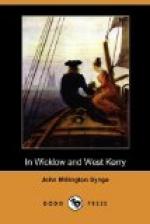One of the young men had been thrown from a car a few days before on his way home from Dingle, and his face was still raw and bleeding and horrible to look at; but the young girls seemed to find romance in his condition, and several of them went over and sat in a group round him, stroking his arms and face. When the card-playing was over I showed the young men a few tricks and feats, which they worked at themselves, to the great amusement of the girls, till they had accomplished them all. On our way back to the village the young girls ran wild in the twilight, flying and shrieking over the grass, or rushing up behind the young men and throwing them over, if they were able, by a sudden jerk or trip. The men in return caught them by one hand, and spun them round and round four or five times, and then let them go, when they whirled down the grassy slope for many yards, spinning like peg-tops, and only keeping their feet by the greatest efforts or good-luck.
When we got to the village the people scattered for supper, and in our cottage the little hostess swept the floor and sprinkled it with some sand she had brought home in her apron. Then she filled a crock with drinking water, lit the lamp and sat down by the fire to comb her hair. Some time afterwards, when a number of young men had come in, as was usual, to spend the evening, some one said a niavogue was on its way home from the sports. We went out to the door, but it was too dark to see anything except the lights of a little steamer that was passing up the sound, almost beneath us, on its way to Limerick or Tralee. When it had gone by we could hear a furious drunken uproar coming up from a canoe that was somewhere out in the bay. It sounded as if the men were strangling or murdering each other, and it seemed almost miraculous that they should be able to manage their canoe. The people seemed to think they were in no special danger, and we went in again to the fire and talked about porter and whisky (I have never heard the men here talk for half an hour of anything without some allusion to drink), discussing how much a man could drink with comfort in a day, whether it is better to drink when a man is thirsty or at ordinary times, and what food gives the best liking for porter. Then they asked me how much porter I could drink myself and I told them I could drink whisky, but that I had no taste for porter, and would only take a pint or two at odd times, when I was thirsty.
‘The girls are laughing to hear you say that,’ said an old man; ’but whisky is a lighter drink, and I’d sooner have it myself, and any old man would say the same.’ A little later some young men came in, in their Sunday clothes, and told us the news of the sports.




